Understanding dementia is one of the most pressing public health challenges of our time. With millions affected worldwide and numbers projected to rise, the demand for effective dementia treatments and memory loss drugs has never been more urgent. People often ask, what is the best medication for dementia? But the answer isn’t straightforward—it varies depending on the type of dementia, the stage of progression, individual response to drugs, and coexisting health conditions. While there is no known cure for dementia, a growing arsenal of medications and therapies can alleviate symptoms, slow cognitive decline, and significantly improve quality of life.
You may also like: How to Choose the Best Brain Supplements for Adults: Science-Backed Ingredients That Support Focus, Memory, and Mental Clarity
As the medical field continues to evolve, so does our understanding of what medications for memory impairment truly work. From FDA-approved options like donepezil and memantine to off-label combinations such as Exelon with Namenda to help with anxiety, physicians now have a diverse set of tools at their disposal. However, navigating this complex treatment landscape requires nuanced knowledge, scientific backing, and consideration of each patient’s unique condition. This article explores the current evidence behind the most effective drugs for dementia, including how they work, when they’re used, and which combinations offer the greatest benefit.
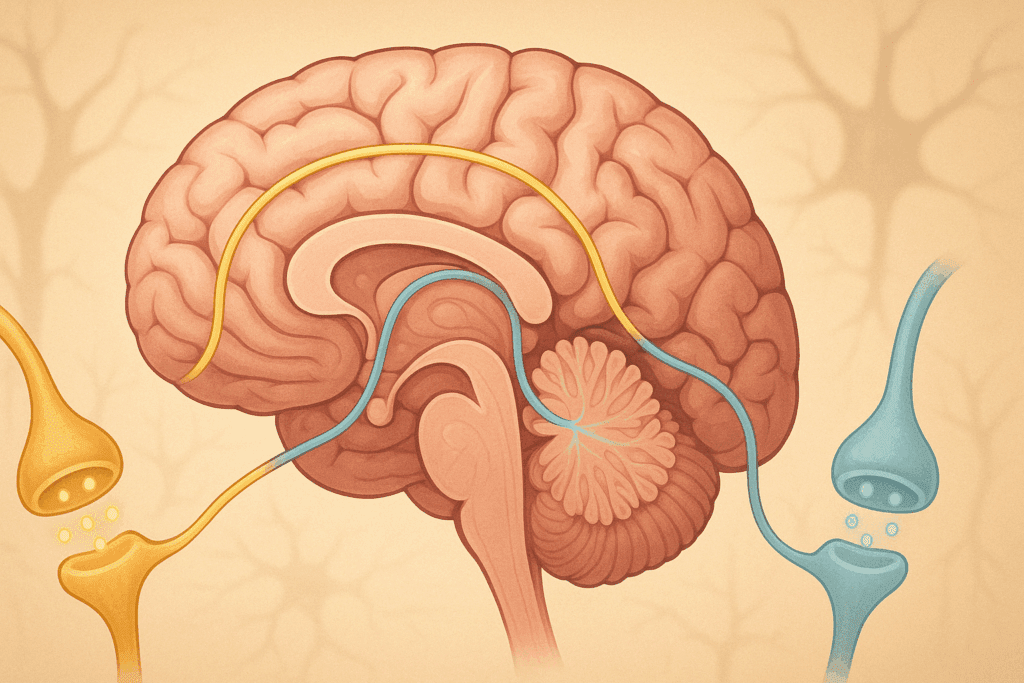
How Dementia Medications Work: A Foundation for Cognitive Support
Dementia medications primarily target the brain’s neurotransmitters—chemicals that facilitate communication between neurons. Most approved drugs for dementia focus on two key mechanisms: increasing acetylcholine levels and regulating glutamate activity. These chemical pathways play critical roles in memory, decision-making, and learning, all of which deteriorate as dementia progresses.
Cholinesterase inhibitors, such as donepezil (Aricept), rivastigmine (Exelon), and galantamine (Razadyne), work by slowing the breakdown of acetylcholine, a neurotransmitter involved in learning and short-term memory. These medications for memory impairment are generally prescribed during the early to moderate stages of dementia, especially in Alzheimer’s disease. They don’t halt the disease but can delay cognitive decline and improve daily functioning.
On the other hand, memantine (Namenda) acts on the glutamatergic system by regulating the activity of glutamate, another critical neurotransmitter. It is often prescribed during moderate to severe stages of dementia, where overstimulation of glutamate receptors can lead to neuronal damage. By modulating this pathway, memantine helps maintain synaptic function and may slow the rate of memory loss.
When combined, these two classes can offer complementary benefits. For example, using Exelon with Namenda to help with anxiety and cognitive decline can be particularly effective in individuals experiencing both emotional disturbances and worsening memory. Understanding these mechanisms offers a clearer picture of why certain medications are prescribed at specific stages and for particular types of dementia.
The Four FDA-Approved Anti-Dementia Drugs: Efficacy and Limitations
The medical community often references the four anti-dementia drugs that have received FDA approval for the treatment of Alzheimer’s disease: donepezil, galantamine, rivastigmine, and memantine. These medications are sometimes used for other types of dementia as well, though their effectiveness may vary.
Donepezil remains the most widely prescribed drug among them. As a once-daily cholinesterase inhibitor, it is typically well-tolerated and has shown modest benefits in cognition, behavior, and global functioning. Galantamine and rivastigmine operate similarly but with unique pharmacological properties. Galantamine also modulates nicotinic receptors, while rivastigmine is available in a transdermal patch, offering an alternative for those who experience gastrointestinal side effects.
Memantine, the only non-cholinesterase inhibitor among the group, is particularly valuable during later stages of dementia. When asking what stage of dementia is memantine used for, clinicians generally point to moderate-to-severe Alzheimer’s, vascular dementia, or mixed dementia. While its effects are not curative, memantine has been associated with reduced agitation, better attention span, and improved decision-making.
Despite their benefits, these four anti-dementia drugs are not without limitations. The effects are often modest, and patients can respond differently. Side effects such as nausea, dizziness, or bradycardia may occur, especially in older adults with multiple health conditions. Nevertheless, for many patients, these drugs for dementia provide meaningful symptom relief and delay the need for institutional care.
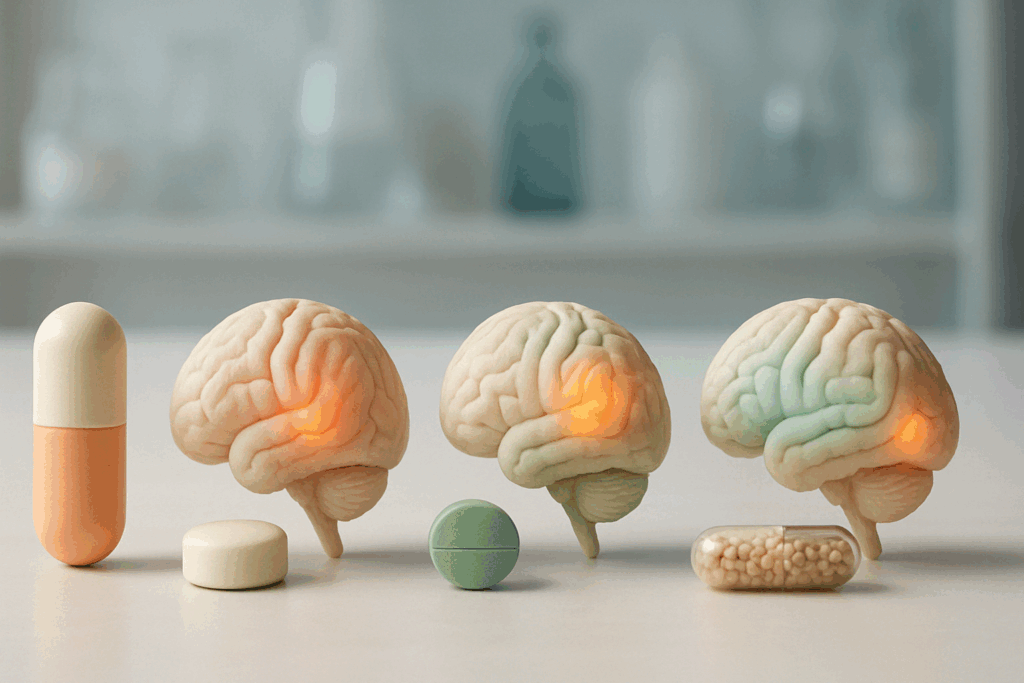
Combination Therapy: When Two Is Better Than One
One of the most promising developments in dementia treatment involves the strategic combination of medications. A frequently asked question in clinical settings is whether patients can take both a cholinesterase inhibitor and memantine simultaneously. Research increasingly supports this dual-therapy approach, particularly for those transitioning from moderate to severe stages of dementia.
Combining Exelon with Namenda, for example, may offer a broader spectrum of symptom control. Exelon supports memory and attention by boosting acetylcholine, while Namenda helps stabilize mood and decision-making through glutamate modulation. In some studies, this combination has improved outcomes in both cognitive and behavioral domains, including reductions in anxiety and apathy.
However, the decision to initiate combination therapy is not made lightly. Physicians must consider drug interactions, patient tolerance, and the potential for side effects. But when implemented correctly, such strategies can enhance quality of life and possibly slow functional decline. Patients and caregivers often report better engagement, fewer disruptive behaviors, and improved participation in daily activities.
Addressing Behavioral and Psychological Symptoms of Dementia
Beyond memory loss, many individuals with dementia experience behavioral and psychological symptoms such as aggression, delusions, depression, or anxiety. These symptoms can be more disruptive than cognitive decline itself and often prompt the need for medication adjustments or institutional care.
When exploring what is the happy pill for dementia patients, healthcare professionals might refer to selective serotonin reuptake inhibitors (SSRIs) like sertraline or citalopram. These antidepressants are often prescribed off-label to manage mood disorders and emotional instability associated with dementia. While they don’t improve memory directly, they can greatly reduce caregiver burden by stabilizing behavior and improving patient well-being.
Antipsychotic drugs may also be used in severe cases, though with caution. Questions like is Aricept an antipsychotic reveal a common misconception. Aricept is not an antipsychotic—it’s a cholinesterase inhibitor. True antipsychotics such as risperidone or olanzapine may be reserved for extreme agitation or psychosis but carry risks of increased mortality in older adults with dementia. Therefore, they are generally prescribed at the lowest effective dose and for the shortest duration possible.
For anxiety and mild agitation, some clinicians consider benzodiazepines, though these come with their own risks, including falls and further cognitive impairment. Each case requires a personalized approach, often involving trial and error to find the optimal therapeutic balance.
Memory Medication for Specific Dementia Types: A Targeted Approach
Dementia is not a single disease but an umbrella term encompassing various conditions with distinct pathological mechanisms. As such, the effectiveness of memory medication can differ significantly depending on the dementia subtype.
In Alzheimer’s disease, which accounts for the majority of cases, cholinesterase inhibitors and memantine form the cornerstone of treatment. But in vascular dementia, which results from reduced blood flow to the brain, medications may also include blood pressure control agents and anticoagulants to manage underlying cardiovascular risk factors.
For Lewy body dementia, the picture becomes more complex. Patients often experience vivid hallucinations, parkinsonian symptoms, and fluctuating attention. Cholinesterase inhibitors like rivastigmine have shown benefit in this population, particularly in improving cognition and reducing hallucinations. However, antipsychotic sensitivity in these patients is a major concern, requiring extreme caution when managing behavioral symptoms.
In frontotemporal dementia, medications for memory impairment are often less effective. This form primarily affects personality and behavior rather than memory in the early stages. Here, SSRIs or mood stabilizers may be more helpful than traditional dementia drugs. A tailored pharmacological plan, informed by subtype and symptom presentation, is essential for optimal care.
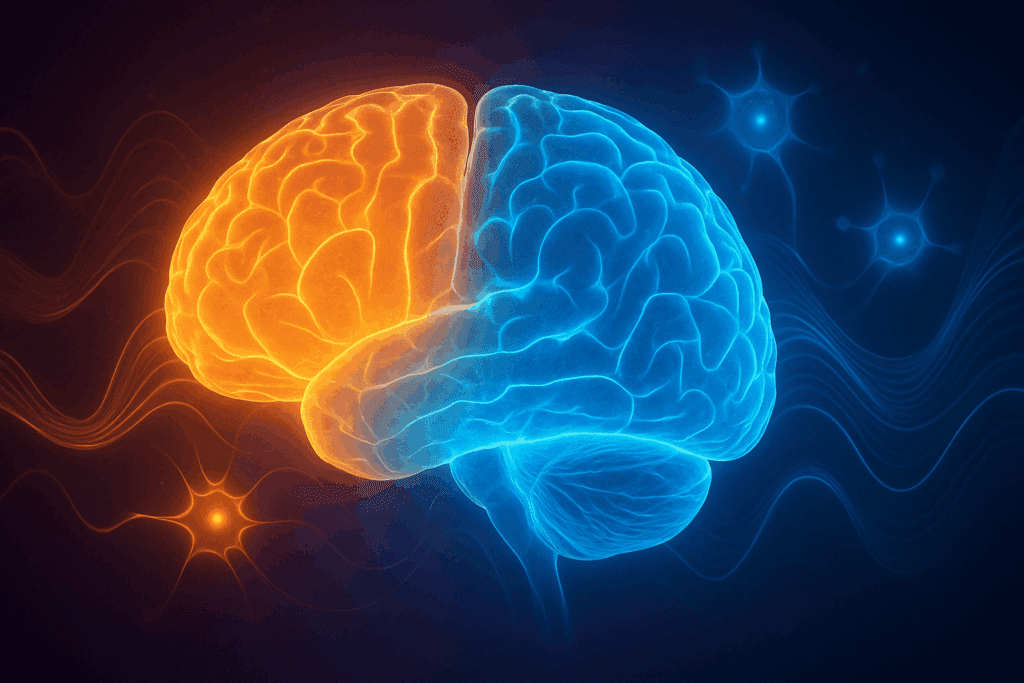
What Drugs Are Used for Dementia Patients in Practice?
When considering what drugs are used for dementia patients in real-world settings, prescribing patterns often reflect both evidence-based guidelines and individual variability in patient response. The three most commonly prescribed drugs for dementia are donepezil, memantine, and rivastigmine. These medications cover a wide range of symptoms and stages, offering physicians flexible options tailored to each patient’s needs.
Donepezil is often the starting point due to its long track record, ease of use, and broad approval for all stages of Alzheimer’s. Rivastigmine may be favored for patients with Lewy body or Parkinson’s disease dementia due to its added behavioral benefits. Memantine tends to be introduced as symptoms worsen, providing additional support in the later phases of cognitive decline.
Physicians must also carefully weigh the list of drugs linked to dementia when prescribing other medications for unrelated conditions. Anticholinergics, certain antihistamines, and some benzodiazepines have been associated with an increased risk of dementia. The phrase medications that cause dementia reflects growing concern in the medical community about polypharmacy and iatrogenic cognitive decline, particularly in older adults.
Therefore, deprescribing—or the strategic withdrawal of unnecessary medications—is becoming an important part of dementia care. A thorough review of a patient’s medication list can help identify and eliminate drugs that may be exacerbating memory loss or impairing cognition.
Evaluating Effectiveness: Can You Slow Down Dementia with Medication?
One of the most critical questions families ask is whether it’s possible to slow down dementia with medication. The answer is nuanced. While no current drugs can reverse neurodegeneration, multiple studies have shown that certain medications can decelerate cognitive decline, particularly when used early in the disease course.
Donepezil and galantamine, for instance, have demonstrated the ability to maintain memory and language function longer than placebo, especially in early to mid-stage Alzheimer’s. Memantine, though more modest in its cognitive effects, contributes to functional preservation and reduces behavioral disturbances.
For patients and caregivers, even a slight slowing of progression can translate to months or years of independent living. This makes early diagnosis and timely initiation of dementia treatments critically important. The question does memantine improve memory reflects a broader hope for cognitive improvement. While true memory restoration may not be possible, memantine can enhance attention and reduce distractibility, making day-to-day life more manageable.
Ultimately, medications are just one component of comprehensive dementia care. When paired with cognitive therapies, social engagement, physical activity, and nutritional support, drug therapy becomes part of a multi-pronged strategy to support brain health and preserve dignity throughout the disease course.
What Do Doctors Prescribe for Short-Term Memory Loss?
Short-term memory loss can occur with or without dementia and may stem from various causes including depression, sleep disorders, medication side effects, or nutritional deficiencies. When memory loss is linked to a diagnosed dementia, doctors typically prescribe cholinesterase inhibitors to enhance attention and memory processing in the early stages.
In cases where dementia is not yet confirmed, or when memory loss appears mild and isolated, clinicians may explore reversible causes before turning to dementia pills. For example, vitamin B12 deficiency and hypothyroidism are known to impair memory and can be treated effectively. Sleep disorders such as sleep apnea may also cause cognitive fog and should be addressed as part of a differential diagnosis.
Still, when short-term memory loss is due to neurodegeneration, early intervention with drugs like donepezil or rivastigmine can offer significant cognitive stabilization. The challenge lies in distinguishing benign forgetfulness from pathological decline—a distinction that underscores the importance of comprehensive cognitive assessments.
Dementia Medications to Avoid: Weighing the Risks
Despite the promise of many memory loss drugs, some medications should be approached with caution. A growing body of research has highlighted certain dementia medications to avoid due to limited efficacy, increased side effects, or higher mortality risk. Antipsychotics top this list, particularly in older patients with cardiovascular conditions or Parkinsonian features.
Long-term use of benzodiazepines is another concern. These drugs can impair memory, exacerbate confusion, and increase fall risk. Some anticholinergic medications—commonly found in over-the-counter sleep aids or bladder control medications—are also among the drugs that can cause dementia with chronic use. As such, careful medication review and monitoring are essential, especially when patients are already managing multiple prescriptions.

Standalone FAQ Section: Dementia Medications, Treatments, and Cognitive Support – Expert Insights
1. What do doctors prescribe for short-term memory loss, and how effective are these medications?
Doctors often start with medications for memory impairment such as donepezil, galantamine, or rivastigmine when short-term memory issues are suspected to stem from early-stage dementia. However, the effectiveness of these memory pills varies widely depending on the underlying cause. For memory issues linked to stress, depression, or sleep disorders, these drugs may have limited impact unless the root cause is addressed. Interestingly, some physicians may trial Exelon with Namenda to help with anxiety and cognitive symptoms in early Alzheimer’s, especially if behavioral disturbances are also present. Non-pharmaceutical strategies like structured cognitive stimulation, social interaction, and aerobic exercise have shown promise as adjunct therapies, especially for individuals not ready for full pharmacologic intervention.
2. Can you slow down dementia with medication, or is progression inevitable?
While no medication can stop dementia entirely, certain dementia treatments can modestly delay its progression. Cholinesterase inhibitors like donepezil or rivastigmine, and NMDA receptor antagonists like memantine, help maintain cognitive and functional ability for a longer period in many patients. When used consistently, these meds for dementia may delay the need for full-time care by several months or even years. Moreover, combining pharmacologic approaches with lifestyle modifications—like sleep optimization, cardiovascular health management, and social engagement—can further slow the rate of decline. The key is early intervention: starting dementia medications when symptoms are mild often yields the most noticeable benefit.
3. What is the best prescription medicine for memory loss caused by dementia?
The answer depends on the stage and type of dementia, but donepezil and memantine are often at the top of the list. Among the 4 anti dementia drugs approved by the FDA—donepezil, rivastigmine, galantamine, and memantine—each works a bit differently. Donepezil is frequently recommended in the earlier stages, while memantine is reserved for moderate to severe cases. Recent studies also support combining both (such as Exelon with Namenda to help with anxiety and memory) for synergistic effects. Physicians tailor choices based on symptom patterns, tolerability, and comorbidities, which is why there’s no one-size-fits-all answer to what is the best medication for dementia—it’s often a customized treatment plan.
4. What drugs are used for dementia patients who also suffer from anxiety or behavioral symptoms?
When behavioral changes like agitation or anxiety accompany memory loss, doctors may integrate combination dementia therapies. This can include pairing dementia pills like memantine with SSRIs or antipsychotics in low doses. While is Aricept an antipsychotic is a common question, the answer is no—it’s a cholinesterase inhibitor. However, in more complex cases, medications like risperidone or quetiapine may be cautiously prescribed for agitation or psychosis. It’s crucial to balance symptom relief with safety, especially in elderly patients vulnerable to side effects like increased fall risk or cardiovascular events.
5. What stage of dementia is donepezil used for, and when does memantine become appropriate?
Donepezil is commonly prescribed in mild to moderate stages, where enhancing acetylcholine can still significantly improve daily functioning. However, what stage of dementia is donepezil used for isn’t limited to early phases; it’s often continued alongside memantine in more advanced cases. What stage of dementia is memantine used for typically begins at moderate stages, especially when there are signs of confusion, aggression, or functional decline. Studies support that combining both drugs can offer broader cognitive and behavioral support. Importantly, the timing of introducing memory medication is critical, and gradual titration is often necessary to minimize side effects.
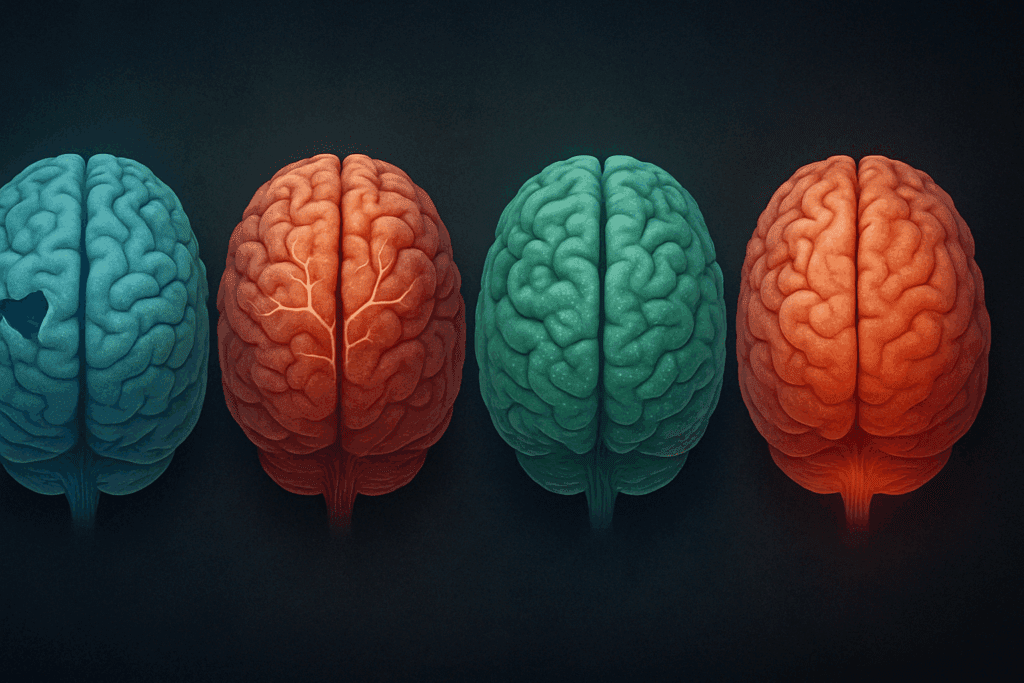
6. What are the 3 most commonly prescribed drugs for dementia, and why are they preferred?
The most widely used drugs for dementia are donepezil, rivastigmine, and memantine. Donepezil remains a first-line agent due to its relatively well-tolerated profile and clear benefit in preserving memory and attention. Rivastigmine is especially preferred in cases of Parkinson’s-related dementia due to its dual action on acetylcholine and butyrylcholine. Memantine’s unique NMDA modulation is particularly effective for reducing overstimulation and preserving executive function in moderate to late stages. These three make up a significant portion of what drugs are used for dementia patients because of their evidence-based track record and multi-symptom utility.
7. Are there any dementia medications to avoid due to side effects or poor outcomes?
Yes, caution is warranted when prescribing certain memory loss drugs, particularly in patients with multiple comorbidities. First-generation antipsychotics and benzodiazepines are among the most concerning dementia medications to avoid, due to their strong associations with falls, sedation, and worsening cognition. Additionally, overuse of diphenhydramine or long-acting benzodiazepines can be medications that cause dementia-like symptoms over time. Even among commonly prescribed medications, individual tolerability varies—some may develop bradycardia with cholinesterase inhibitors or hallucinations with memantine. The decision must be personalized, weighing the benefits of dementia treatments against potential risks.
8. What is the “happy pill” for dementia patients, and does it really work?
The term “happy pill for dementia patients” is informally used to describe drugs that improve mood and sociability in individuals with cognitive decline—typically SSRIs like sertraline or citalopram. While not true dementia medications, these are often adjuncts to help manage anxiety, irritability, or apathy. Some patients show improved participation in daily activities and reduced resistance to care when these are used thoughtfully. However, antidepressants should never replace memory medication, and their use should be frequently re-evaluated. The “happy pill” metaphor can be misleading—it’s less about inducing euphoria and more about improving emotional regulation and engagement.
9. What drugs that can cause dementia should be reviewed or discontinued in older adults?
Certain medications have been linked to cognitive impairment in long-term use and should be scrutinized in elderly populations. These include anticholinergics (e.g., oxybutynin), benzodiazepines, and some sedative-hypnotics. A growing list of drugs linked to dementia also includes some antihistamines and tricyclic antidepressants. These substances interfere with acetylcholine transmission, a pathway already compromised in dementia. Clinicians often recommend deprescribing such medications when possible and switching to safer alternatives. Being aware of drugs that can cause dementia-like symptoms is essential for both prevention and avoiding exacerbation of existing cognitive issues.
10. Is there medicine for dementia that actually improves memory, or do they only manage symptoms?
Many patients and families ask, is there medication for dementia that truly enhances memory rather than just delaying decline. While no drug can fully restore memory, does memantine improve memory? Evidence shows that memantine can enhance recall and attention span in moderate-to-severe stages, especially when combined with donepezil. The key lies in expectation management—dementia pills don’t cure the disease but may create periods of greater clarity and function. Supplementary strategies like reminiscence therapy, tailored activities, and even music-based interventions can significantly amplify the effects of medications for memory impairment, especially when started early.
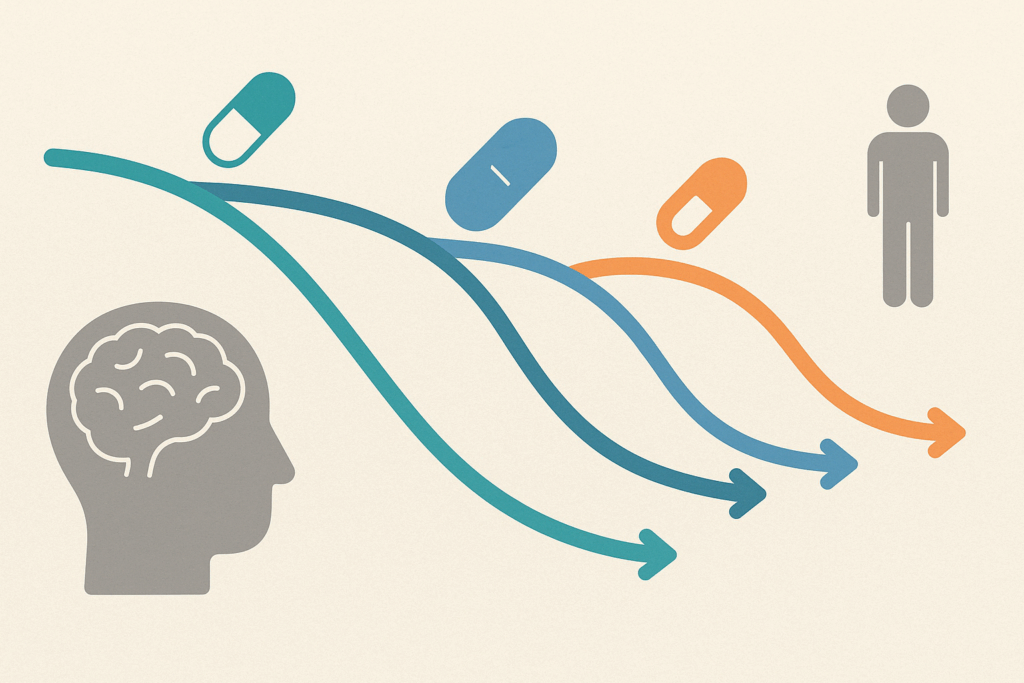
Conclusion: Choosing the Best Medication for Dementia Based on Evidence and Individual Needs
So, what is the best medication for dementia? The answer lies not in a single drug but in the informed, individualized use of medications tailored to the type, stage, and symptoms of the disease. Whether it’s initiating donepezil in early-stage Alzheimer’s, combining Exelon with Namenda to help with anxiety and memory loss, or cautiously using SSRIs for mood stabilization, the most effective dementia treatments are those grounded in science and guided by clinical judgment.
Effective dementia therapies must balance potential benefits with safety, especially in vulnerable older populations. Understanding which memory loss drugs work best, and when to use them, empowers caregivers and clinicians to make thoughtful decisions. From the core group of four anti-dementia drugs to nuanced off-label applications, the treatment landscape continues to evolve—offering hope and better quality of life for those affected.
In a world where cognitive health is increasingly valued, asking questions like is there medication for dementia, what drugs are used for dementia patients, and what is the best drug to improve memory is not only reasonable—it’s necessary. With ongoing research, improved diagnostic tools, and a growing awareness of medications that cause dementia versus those that help, we move closer to a future where cognitive decline can be managed more effectively, and perhaps one day, prevented altogether.
Was this article helpful? Don’t let it stop with you. Share it right now with someone who needs to see it—whether it’s a friend, a colleague, or your whole network. And if staying ahead on this topic matters to you, subscribe to this publication for the most up-to-date information. You’ll get the latest insights delivered straight to you—no searching, no missing out.


